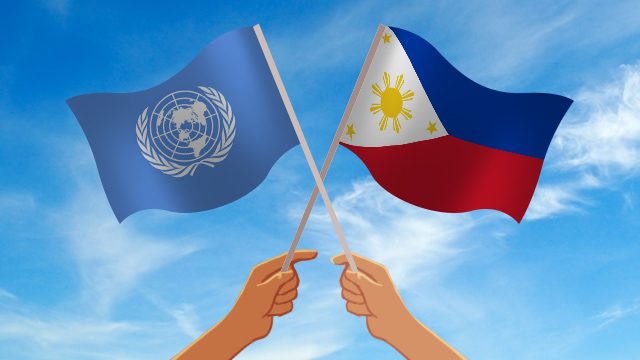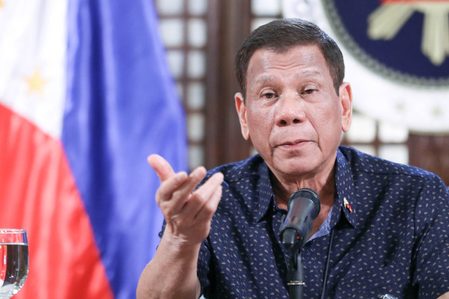SUMMARY
This is AI generated summarization, which may have errors. For context, always refer to the full article.

President Rodrigo Duterte is set to make his first appearance at the United Nations General Assembly (UNGA) since he assumed office. The speech, which Duterte would make on September 23 Manila time, comes a week after the UN human rights chief, Michelle Bachelet, called to halt policies and rhetoric that lead to deaths in the Philippines.
Days after Bachelet’s remarks, the European Parliament warned the Philippines it could lose tariff perks over human rights abuses.
This is the most high-profile international speech of Duterte, who has been criticized for his parochial view of global affairs – and who fosters ties more with China and Russia than with Western democracies most associated with the UN.
Duterte has also cursed the UN several times and “joked” about leaving the international organization.
What is the UNGA, and why is it a big deal? What should we expect from the President’s speech as a participating member?
What is the UN General Assembly?
The UNGA is the main deliberative, policy-making, and representative organ of the UN. Created in 1945 under the UN Charter, it is a space for member states to discuss, debate, and make recommendations on subjects pertaining to international peace and development.
The Philippines became a UN member state in October 1945. In 1949, the late General Carlos P. Romulo (then Chief of the Philippine Mission to the United Nations) became the 4th President of the UNGA.
The General Assembly meets every year in its regular session on the Tuesday of the third week of September, according to the UNGA’s rules of procedure. The UNGA consists of all 193 member states of the UN, each with an equal say in decision-making at one vote.
Prominent issues discussed in UNGAs are development, disarmament, international law, and peaceful arbitration of disputes between nations. As held in the UN Charter, UN members make recommendations for international cooperation in:
- the political field, encouraging progressive development of international law;
- economic, social, cultural, educational, and health fields; and
- upholding human rights and fundamental freedoms indiscriminate of race, sex, language, and religion.
In recent years, nations have discussed climate change, the prohibition of nuclear weapons, women’s empowerment, and development in “global hot spots” like the Central African Republic, South Sudan, and Yemen.
More than 500 treaties have been created under the UNGA. The assembly adopted the Universal Declaration of Human Rights in 1948. More recently, the UNGA called to action the 2015 Sustainable Development Goals (SDGs) to eradicate poverty and address climate change by 2030.
What can we expect from this year’s UNGA?
This year’s UNGA, presided by Turkish diplomat Volkan Bozkir, marks 75 years since the United Nations was founded. It is the first time that member states will not meet in person due to the coronavirus pandemic.
The 75th UNGA will focus on the nations’ commitment to multilateralism, especially with regard to the pandemic. Leaders will submit pre-recorded speeches to be played “as live” in the General Assembly Hall in the UN Headquarters in New York City, United States.
Apart from the coronavirus, other big items on the agenda include climate change, biodiversity, the SDGs, and gender equality.
The hall will not be empty, as the speeches will be introduced by physically present country representatives. The Philippines’ ambassador and permanent representative is former foreign undersecretary Enrique Manalo.
Philippine participation
Since the first UNGA session in 1946, the Philippines has only missed making statements during the General Debate thrice: in 1949, 1952, and 1955. Statements need not be made by heads of state – diplomats and foreign secretaries can speak on behalf of the country as well.
Late ousted dictator Ferdinand Marcos was the first Philippine head of state to address the UNGA in the 21st session, on September 21, 1966 – 6 years before he declared martial law in the Philippines.
Marcos updated the UN on its relations with Asian neighbors. Normal relations were restored between the Philippines and Malaysia, and the Philippines and Singapore. He also reported sending a 2,000-man civic action group to then South Vietnam, which was then facing the Vietnam war.
“The destiny of Asia is, I believe, the destiny which it shares with the whole world, but more specifically, with the developing nations of Africa and Latin America… that is, social progress and better standards of life in wider freedom,” said Marcos.
Marcos again addressed the UNGA in 1982 along with Romulo, who had continued involvement and speeches in the UNGA even after his term as president.
Corazon Aquino also spoke at the UNGA in 1986, months after she was swept to the presidency following Marcos’ ouster. “We have restored human rights and liberated our people from the oppression and corruption of a government that had long since lost their support,” she said in her opening sentences.
Aquino said that the rights Filipinos fought for were similarly enshrined in the United Nations covenants. She turned to the situation in South Africa, which was plagued with institutional racial segregation, and likened the incarceration of anti-apartheid icon Nelson Mandela to the experience of her late husband Benigno Aquino Jr.
She said the Philippines would support any action to advance peace and freedom in South Africa.
“The United Nations should never be an exclusive club for one ideological model, for that would defeat its primary purpose – to keep peace in an imperfect world. There are many ways to run a country, but there is only one way to treat people: with decency and respect for their uniqueness as individuals,” she said.
Other Philippine presidents who made statements at the General Assembly include Fidel Ramos, Joseph Estrada, Gloria Macapagal Arroyo, and Benigno Aquino III.
In Duterte’s term, the officials who addressed the UNGA are his 3 foreign secretaries: Perfecto Yasay Jr, Alan Peter Cayetano, and Teodoro Locsin Jr. – Rappler.com
Add a comment
How does this make you feel?

There are no comments yet. Add your comment to start the conversation.